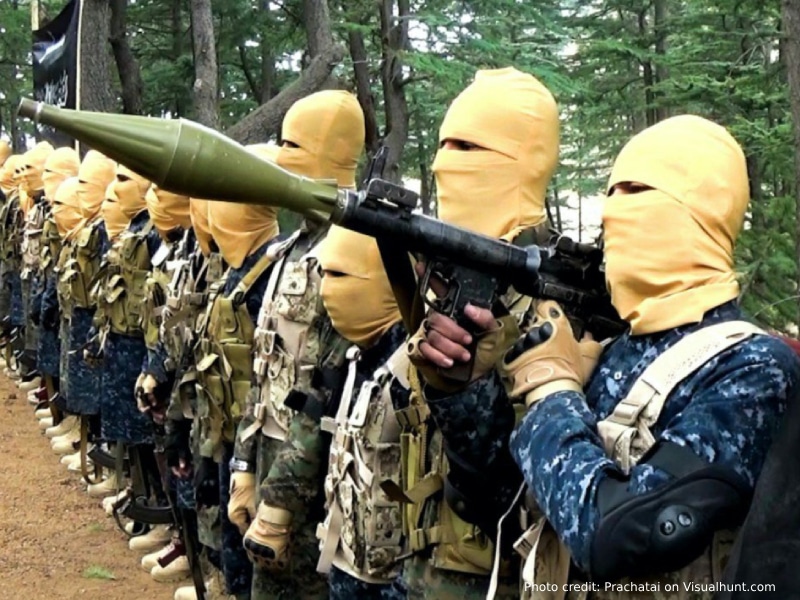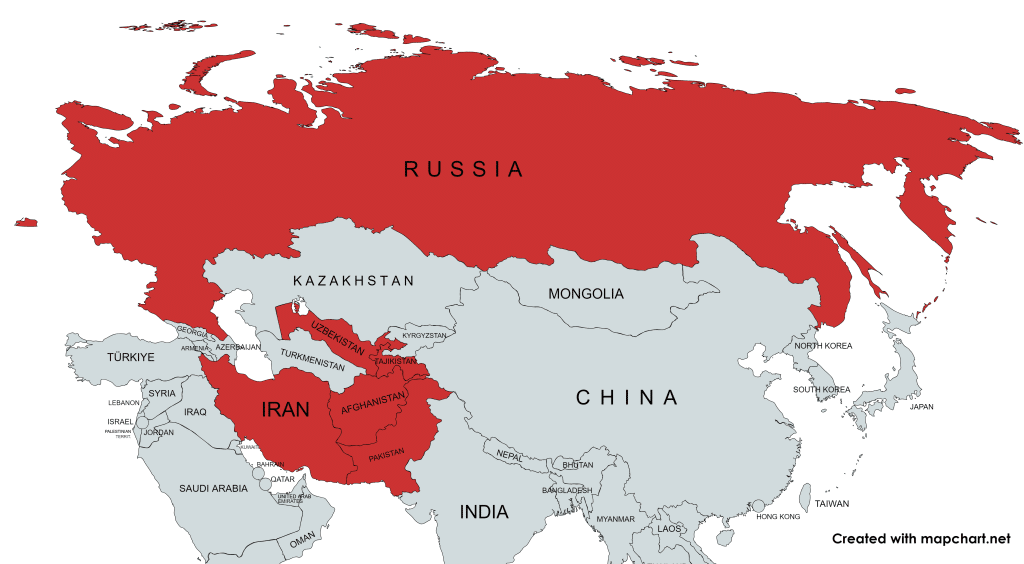
The Islamic State Khorasan Province (ISIS-K), also known as IS-K, carried out a terrorist attack at the Crocus City Hall in Moscow just over a month ago. At least 144 people were killed, and more than 360 were injured. A few hours after the attack, four suspects were detained under suspicion of carrying out this terrorist attack, that is, breaking into the concert hall, opening fire from an automatic weapon and setting fire to the building, which led to the collapse of the roof structure. The attackers were identified as citizens of the Republic of Tajikistan, a Central Asian country that, along with Pakistan, Afghanistan, and Iran, falls within the operational area of this terrorist organization. Since its inception, ISIS-K has carried out over 900 terrorist attacks. While Russia is not primarily within this group of countries, the attack on March 22 of this year raises concerns about the potential expansion of ISIS-K's operational area to other countries in the broader Middle East, Central and South Asia, and even Europe.
The Islamic State Khorasan Province (ISIS-K) is a branch of the Islamic State, which conducts most of its activities in Afghanistan and Pakistan. In Afghanistan, its main enemy is the current government, particularly the Taliban, who were deemed insufficiently extreme and radical by former members of the Pakistani Taliban back in 2015, when this branch of the Islamic State was founded. They criticize the current Taliban government in Kabul for allegedly betraying jihad and submitting to the United States. The decline in ISIS-K's capacity and resources during 2021 can largely be attributed to U.S. efforts. In June of that year, the UN estimated that the core of this terrorist organization is consisted of between 1,500 and 2,000 fighters, and parallel to the decline in the number of members, the financial support gradually declined. Since the early years of its founding, most of ISIS-K's funding came from the Islamic State central command. However, since 2018, due to the collapse of the central command and increased efforts by Turkish authorities and later the Taliban government in Afghanistan, it became increasingly difficult to secure financial resources. These problems led to the fact that at the beginning of 2023, ISIS-K fighters were not even paid their promised salaries.
At the end of last year, the leadership of ISIS-K partially managed to bypass the obstacles of Turkish authorities by reallocating resources and diversifying sources of funding. However, in the long run, this did not result in greater success. Nevertheless, by successfully circumventing the Taliban's informal banking monitoring system, through multiple smaller payments, financial inflow was partially restored, thus avoiding complete financial collapse. The lack of finances directly contributed to a decrease in on-the-ground activities. Consequently, members of the aforementioned terrorist organization further developed and expanded their propaganda through the internet, continued recruiting new fighters, and developed their underground network in Afghanistan. All of this likely contributed to some extent to the recovery of ISIS-K forces, but it is difficult to assess to what extent they have been able to increase their capacities, if at all.
However, finding alternative ways of financing is certainly not the only factor that will affect their activities and the functioning of the entire organization in the future. Indeed, active efforts have been ongoing for some time to combat their operations, and extensive actions have been taken to suppress their activities, most of which have been carried out by the Taliban in Afghanistan, where this terrorist organization has carried out the largest number of attacks so far. However, despite the aforementioned countermeasures, the effectiveness and long-term impact of these actions remain questionable, primarily due to the lack of necessary technologies and the inability to implement more concrete measures in terms of checking funding sources and informal banking, which is important for the Taliban themselves.

Additionally, there is a problem of division within local communities in Afghanistan, as primarily Salafists are aligned with ISIS-K ideology, perpetuating the lack of unity in the fight against this terrorist organization. Moreover, there is evident discord among various jihadist groups, which initially supported the Afghan Taliban jihad but then, for various reasons, switched sides to ISIS-K. This is the case with the Juldash faction of the Islamic Movement of Uzbekistan. The same is the case with the Tajik Taliban, for which there are allegations that due to dissatisfaction with the native leadership, they are increasingly associated with ISIS-K and thus provide an opportunity for further expansion of their activities. This argument is supported by the fact that the terrorists who carried out the attack on the Crocus concert hall in Moscow were also citizens of Tajikistan.
Thus, the Russian Federation became the first country outside the previously mentioned region to be targeted by members of the Islamic State Province of Khorasan. However, even with large-scale attacks and a large number of victims, it cannot be concluded with certainty that members of ISIS-K will carry out their attacks in the same or similar manner in other European countries. The reason for this is primarily reflected in the fact that their goals are mainly local and regional in nature, with the exception of attacks in Russia. The animosity towards Russia stems primarily from its actions and fight against the Islamic State in Syria, its general support for the Taliban in Afghanistan, the treatment of Muslims by Russian authorities in the Caucasus, and its historical legacy, including the Soviet invasion of Afghanistan. ISIS-K members hold a similar attitude towards the United States, which had its troops in Afghanistan for two decades after 2001.
In line with this, it is necessary to consider more broadly the possibilities of future attacks following the March scenario, as increased activity of ISIS-K members outside of Afghanistan and Pakistan has been recorded since the beginning of this year. In addition to the Moscow attack, one of the largest attacks since the beginning of 2024 carried out by members of this terrorist organization occurred in Iran on January 3, when they detonated a bomb during the commemoration of General Qasem Soleimani. However, despite this, there currently seem to be no concrete evidence supporting a real threat of a terrorist attack on European soil by ISIS-K members, as they do not have primary objectives aimed at direct action within the territories of these countries. However, this does not mean that the European continent is not threatened by terrorist action, as there are numerous cells, groups, and organizations directly linked to the Islamic State, Al-Qaeda, or other jihadist organizations, particularly in Western European countries. Additionally, potential targets for attacks could include coalition military bases, the United States, or NATO in the broader Middle East, Central and South Asia, which ISIS-K members perceive as legitimate targets.
Therefore, the focus of the fight against the Islamic State in the Khorasan Province in the coming period will largely depend on the consolidation of Taliban authority in Afghanistan, as well as the measures taken by that government against ISIS-K. Currently, although efforts are being made in this direction, it seems that the Taliban are not doing enough, as they themselves lack the necessary capacity for combat. On the other hand, the situation is further complicated by the unstable environment and reduced international, particularly American, presence in Afghanistan.
In conclusion, the need for better and more effective cooperation among intelligence services around the word is evident, as demonstrated by the Moscow attack, highlighting the potential for tracking ISIS-K activities. This is further supported by the fact that the United States has warned not only Russia but also Iran of the danger of a potential attack by this terrorist organization. On the other hand, in the fight against ISIS-K and its activities, cooperation with Pakistan, where this organization operates intensively, is of paramount importance. Pakistani authorities are therefore taking numerous actions and measures in the field of counterterrorism, but this is still not at the required level, primarily due to internal problems with the Pakistani Taliban (officially known as Tehreek-e-Taliban Pakistan - TTP), who coexist and cooperate with ISIS-K in certain parts of the country. Therefore, although efforts are being made to counter the activities of the Islamic State Khorasan Province, due to the increase in the intensity of attacks and the expansion of its operational area, more concrete responses from different countries can be expected. In this regard, special focus will be on countries in the Middle East and Asia, especially Russia, Iran, and China, for whom ISIS-K has increasingly become a threat in recent years, thereby increasing the risk of future attacks.


